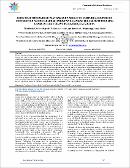| dc.contributor.author | Tita, Rosita | |
| dc.contributor.author | Sri, Nurhayati | |
| dc.contributor.author | Dedah, Jumiatin | |
| dc.contributor.author | Ayi, Rosmiati | |
| dc.contributor.author | Wamaungo, Juma Abdu | |
| dc.date.accessioned | 2023-01-25T10:05:32Z | |
| dc.date.available | 2023-01-25T10:05:32Z | |
| dc.date.issued | 2020-04 | |
| dc.identifier.citation | Tita R. , Sri N. , Dedah J. , Ayi R. , Wamaungo J. A. (2020) Using traditional role-play games by adults to nurture a culture of cooperation among children amidst wide-spread engagement in online games within today’s technological society. DOI: http://dx.doi.org/10.31838/jcr.07.07.29 | en_US |
| dc.identifier.uri | DOI: http://dx.doi.org/10.31838/jcr.07.07.29 | |
| dc.identifier.uri | https://hdl.handle.net/20.500.12504/1171 | |
| dc.description.abstract | Today, children of this millennium are not familiar with traditional games, they are more familiar with online or digital games, thus having less time for interaction with their peers. Within the Sundanese community there is a traditional game in the form of role-play called ajang-ajangan, it comprises of activities undertaken by children to imitate the character of an adult (expressing maturity in action) or a particular community activity. The activities are commonly, taken from those games deemed appropriate and good for child growth and development. This study aims to identify the positive role of ajang ajangan traditional games towards the shaping and enhancing of the character aspect of cooperation in children. The study was conducted using a qualitative study design with a case study method. Data was collected through interviews, observation, and the study of documents. A number of questions were raised during the observation of ajang ajangan activities conducted in the form of role play by the students during field study learning process. The participants of the study were children of RA Alkhodijah Ama Waas school. The study revealed that ajang ajangan activities encourage the development of the children’s character of cooperation during early childhood; there is shared opportunity and chance to participate in all games, including those already played; the participants (children) feel expressed happiness because they play an active role in the game, hence stimulating active participation in all the game’s activities. Based on this research, it has been concluded that ajang ajangan as a traditional game has the ability to foster the development of a spirit of cooperation within society right from the early childhood period, which is a strong aspect of leaving together in the community. | en_US |
| dc.language.iso | en | en_US |
| dc.publisher | Journal of Critical Reviews | en_US |
| dc.subject | Traditional Games | en_US |
| dc.subject | Role play | en_US |
| dc.subject | Cooperation | en_US |
| dc.subject | Child | en_US |
| dc.subject | Character | en_US |
| dc.subject | Ajang Ajangan | en_US |
| dc.title | Using traditional role-play games by adults to nurture a culture of cooperation among children amidst wide-spread engagement in online games within today’s technological society | en_US |
| dc.type | Article | en_US |

